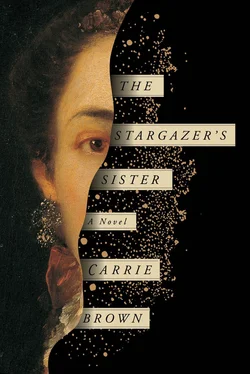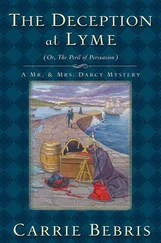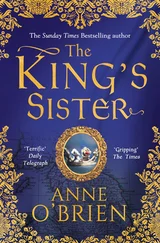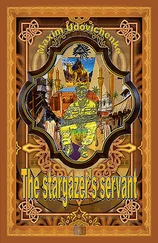The moon people — the Lunarians, William tells her — do not look like the priest.
In the margins of her father’s sheet music, she draws pictures of these Lunarians, giants with long slender legs and faces calm as lakes. She gives these pictures to William, folding them into tiny squares and leaving them in his books or the pockets of his coat, waiting and watching for him to find them. In her mind, the moon creatures have shining tonsures and long eyelashes like those of the gentle horse that occupies the stable. They wag their heavy heads in contemplative agreement with all they see. Soothed by the singing of the stars, they are pleased by everything.
“Excellent!” William says, smiling, unfolding one of her drawings. “It is exactly as I imagine them.”
Now, kneeling on a stool by the cold window, she watches the moon fade as the day brightens by degrees. The bonfire’s smoke rises into the morning light, carrying with it the sour must of rotting apples and the distant voices of the people in the street. She imagines the Lunarians inclining their ponderous heads from their high plane to look down and regard the earth. She imagines one of the bantams’ flame-colored feathers rising lazily inside the smoke, the outstretched arm of the creature that slowly opens its hand, fingers unfurling, to receive it.
Snowflakes drift through the roof in the attic where she sleeps. Sunlight falls through the chinks in summer. This morning the bedclothes wore a layer of frost. She feels the unhappiness of the house around her, her mother’s anger and silence like a presence in the room.
She will not be allowed outside to play, she knows.
She leaves her stool to kneel on a chair by the plain deal table closer to the fire and takes up a spoon, dipping it into a cup of water to fill the spoon’s bowl. Recently William demonstrated for her the mysterious ability of liquid to exceed its space and yet fail to overflow its banks. She raises the brimming spoon to eye level, just as William did, to regard the miraculously curved surface of the water.
The phenomenon in the spoon, William told her, is convexity.
All her brothers — Jacob, William, and Alexander — are clever. All of them are scholars and musicians, but Lina knows that William is the most advanced of the three boys, though Jacob is older by four years. It is William, Lina understands, on whom their father rests his hopes for the family’s glory.
The boys serve as bandsmen in the Hanoverian Foot Guards, where William’s mind is wasted, their father frets to Lina, when the others are not around to hear.
William is our genius, he confides.
Lina knows that there is a war, the rulers of England and Prussia and Austria and France in conflict over who will have dominion where. She understands that her family and their neighbors’ loyalties are to the King of England, as he is elector of Hanover. They all hate the French and must defend the English crown.
William shows her faraway England on a map. She is surprised that it is only a little island, a hunched-over old woman with a beaked nose.
Not even twenty years old, their father laments, yet surely William will be killed in battle.
“Such a loss to the world,” their father says, as if it has already happened. “Our good, good William. Struck down too young.”
Lina hates it when he speaks in this manner.
—
WILLIAM TEACHES LINA THINGS. For instance: convexity. Also animalcules.
A drop of water, William had explained — indeed, all matter in the world — his composed of many tiny particles called atoms, invisible to the naked eye. They cling together even without the reinforcement of walls.
“It’s true,” he’d said, studying her face.
He’d put his cheek beside hers. Together they had gazed at the bulge of water in a spoon.
“That little swell in the water’s surface?” he’d said. “That’s a heap of atoms, all of them piled on top of each other. Atom is from the Greek atomos, meaning indivisible. Everything may be divided except an atom.”
“It is the smallest thing there is?” she had asked.
“Exactly.”
He’s told her, too, about Galileo’s instruments of magnification — his telescope, his occhiolino, his little eye, as he called it — and about the Dutchman Anton van Leeuwenhoek’s microscopes, in which were revealed scores of little swimmers. William had given her van Leeuwenhoek’s word for them: animalcules. They reside in every drop of pond water, William had said, every human tear, in human spittle and blood and mold on a loaf of bread and in the living green of leaves.
He had showed her pictures of van Leeuwenhoek’s drawings.
She’d leaned over the table on her elbows to watch William turn the pages of the book.
Animalcules with little tails! Animalcules with tiny snouts and horns and even hair! How amazing that these creatures perambulate inside the substances that hold them prisoner — even inside her own body — by means of curling and uncurling themselves or twitching their hindquarters or swimming like eels and fish.
Lina had looked at her hand, made a fist, unfolded her fingers.
After this, when she follows the erratic paths of raindrops down the glass with her fingertip, she sees in every drop a city, its minarets and towers, its bustling populace.
It is from William that she understands the central mystery: worlds upon worlds exist in all things.
—
IT IS JACOB, THOUGH, not William, who is their mother’s favorite. She praises the elegance of Jacob’s face, his aquiline nose and finely arched eyebrows. But Jacob is hateful, and he likes to direct his malice toward Lina especially. He laughs as he administers secret pinches, fingers gripping her earlobe. She knows that the appearance of pain or fear or anger attracts him, and she has learned to empty her face of all expression when he is near. She has learned, too, to detect his hidden presence behind a door or a tree, waiting to frighten her.
It is William’s example that Lina wants to follow, William whom Lina loves. William, their father says, is the philosopher king among them. He is the peacemaker, too, somehow holding himself apart from the unhappiness of their family, their mother’s shrill anger, Jacob’s cruelty. Only William is capable of creating harmony in the household, engaging her brothers and their father in discussions of science or mathematics. If William picks up the oboe or violin and begins to play, soon their father joins in, and then Alexander and even Jacob, too, who likes to show off.
Lina and Sophia, who is now twelve, are not given instruments, but Lina loves to listen from the stairs when her brothers and father play. From the first, it has been easy for her to hear the harmonic line. William plays familiar songs for her in parallel keys to demonstrate major and minor scales, the reason one song makes her cry while another makes her dance.
She loves music.
She also loves the placid horse with the drooping lower lip in the stable.
She loves the taste of the yellow apples and the scent of the orchard budding in spring.
She loves her father’s foolish jesting, loves the sound of William’s and Alexander’s voices through the bedroom wall at night. They discuss theories of harmonic construction, questions of philosophy.
“These are complicated matters, Lina,” William says, when she asks questions, but he teaches her to read, writes down words for her.
Calculus. Fluxion.
She loves William’s eyes, which are very dark, almost black, and in which she can see herself reflected when she sits on his lap and holds his face between her hands and stares deep into his eyes. He is not like their father, though, with his ready sympathy, his cooing and tut-tutting and damp gaze and kisses. William does not offer himself to her as her father does. He does not pet her or comfort her. He is elusive in a way that draws her to him. He is always reading or thinking. It seems that with his thoughts alone he can exchange the unpleasantness of the world, the trouble in their household, for something better, finer. She tries to stay near him. If she is at his side, perhaps she, too, will be transported to a better place.
Читать дальше












